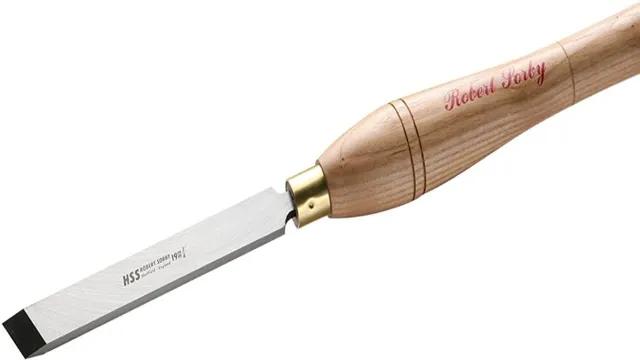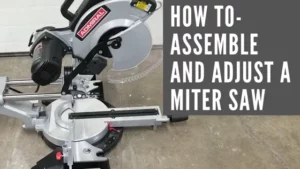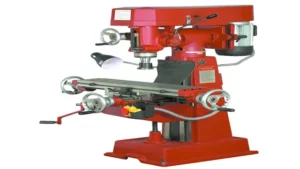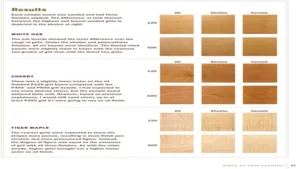When it comes to woodworking, selecting the proper chisel size is crucial for achieving the desired outcome. The right chisel size can make your work easier and faster, while the wrong one can make it difficult and frustrating. But with so many sizes available, where do you start? How do you determine which one to choose? In this blog post, we’ll walk you through the process of selecting the right chisel size for your project, taking into consideration factors such as the type of wood, the project’s size, and your skill level.
Whether you’re a seasoned woodworker or just starting, this guide will help you make the right chisel size decision. So, grab your ruler and let’s get started!
Why Chisel Size Matters
When it comes to woodworking tools, chisels are an absolute must-have. However, what size chisels do you need? The answer largely depends on the project you are working on. For intricate and detailed work, smaller chisels (such as 1/4 inch or 1/2 inch) will be your go-to.
These chisels are great for carving out delicate designs and tight corners. On the other hand, for rougher and bigger projects, larger chisels (such as 1 inch or 2 inch) will be more effective. It’s important to note that having a variety of sizes in your chisel collection will greatly benefit your woodworking abilities.
Not only will it allow you to have more options to choose from, but it will also help you achieve a smoother and more precise finish. So when it comes to the question of what size chisels do you need, the answer is simple: you need a range of sizes to tackle any project that comes your way.
Impact on Precision
When it comes to woodworking, the size of your chisel can have a significant impact on the precision of your work. A smaller chisel is better suited for fine detail work, whereas a larger chisel is best for removing more substantial chunks of wood. It’s essential to have a variety of sizes and shapes of chisels in your woodworking toolbox to be able to achieve the level of precision you desire.
If you’re not careful, using the wrong size chisel can result in imprecise cuts and even damage to your workpiece. Think of it like trying to paint a small canvas with a large brush. It’s possible, but the results will likely not be as detailed or accurate as you want them to be.
So, if you’re looking to take your woodworking to the next level, pay attention to your chisel sizes and make sure you’re using the right one for each task at hand.
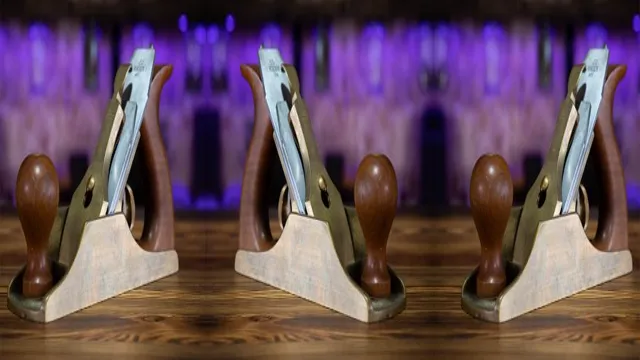
Impact on Efficiency
When it comes to efficiency, the size of your chisel can make all the difference. Larger chisel sizes can make quick work of large projects, but if you’re working on something small or intricate, a smaller chisel may be more efficient. This is because a larger chisel can be too powerful and imprecise for delicate work, while a smaller chisel can provide more control and precision.
It’s important to choose the right chisel size for the task at hand, as this can greatly impact your efficiency and the quality of your work. Don’t be afraid to experiment with different chisel sizes and techniques to find what works best for you and your projects. With practice and experience, you’ll be able to determine the optimal chisel size for any task, and achieve the best results possible.
Measuring Your Project
If you’re wondering what size chisels you need for your project, it depends on the size of the workpiece. For smaller projects, like carving intricate designs in small objects, you’ll need chisels that are 1/8″ to 1/4″ in size. These smaller chisels give you more control over the carving process, allowing you to carve in tight spaces and intricate details.
For larger projects, like building furniture or working with bigger pieces of wood, chisels in the range of 3/4″ to 1″ will be more appropriate. These larger chisels are more durable and can withstand greater force, making them ideal for larger and more demanding projects. Regardless of the project, it’s always important to choose chisels made with high-quality steel that will remain sharp over time and perform well.
Types of Projects
Measuring Your Project When it comes to projects, there are various types that you might encounter in your career. From software development to construction, each project has its unique set of characteristics. But regardless of the type of project, you need to have a way to measure its progress and performance.
This is where metrics come into play. Metrics are the quantifiable measures used to determine the success or failure of a project. By establishing metrics before starting a project, you can better track progress, identify problems, and make timely adjustments.
Some common metrics used for projects include cost, scope, quality, and time. Each metric has its importance, and the choice of which to prioritize depends on the project’s goals and objectives. By measuring your project, you can ensure its success and deliver value to your stakeholders.
Choosing the Right Chisel Size
Choosing the right chisel size is crucial for a successful woodworking project. The first step in selecting the right chisel size is to measure your workpiece accurately. Determine the width and depth of the area that needs to be removed to achieve your desired design.
A good rule of thumb is to choose a chisel width that is slightly narrower than the area you need to remove, as this allows for greater control and precision. For example, if you need to remove a 2-inch-wide section, choose a chisel that is 1 ½ or 1 ¾ inches wide. Remember, the larger the chisel, the more material it can remove, but it can also be more challenging to control.
So, choose the appropriate chisel size based on your level of experience, and the complexity of the project. If you are unsure, start small, and work your way up as you gain more experience. By measuring your project accurately and selecting the appropriate chisel size, you can achieve a professional-quality finish that will make your woodworking project stand out.
Standard Chisel Sizes
If you’re asking yourself “what size chisels do I need?” don’t worry, you’re not alone. Chisels come in a wide range of sizes, but there are some standard sizes that are most commonly used in woodworking. The most common sizes for chisels are 1/4 inch, 1/2 inch, 3/4 inch, and 1 inch.
These sizes are perfect for most woodworking projects and will be the backbone of your chisel collection. However, you may find that you need other sizes for specific tasks such as precision work or larger scale projects. It’s always a good idea to start with the basics and build from there as you become more experienced and encounter new challenges.
Regardless of what size chisels you choose, investing in high-quality tools will ensure that your work is of the highest standard.
4mm Chisel
When it comes to chisels, the 4mm size, also known as the standard chisel size, is a popular choice for many woodworkers and carpenters. It’s the perfect size for fine and intricate cuts, and can be used for a variety of woodworking projects. The 4mm chisel is also great for carving designs and patterns on wood surfaces, and can be used to create a variety of textured finishes.
Although it may not be the largest size available, the 4mm chisel is versatile and can be used for both rough and precise cuts. Whether you are a beginner or an experienced woodworker, having a 4mm chisel in your toolkit can prove to be useful in achieving your woodworking goals. So, if you’re looking for a reliable and effective chisel size, the 4mm chisel is definitely worth considering.
6mm Chisel
A chisel is an essential tool used in woodworking, metalworking, and carving. Chisels come in different shapes, sizes, and types, but the 6mm chisel is a standard size widely used by professionals and DIY enthusiasts. With its narrow, pointed end, the 6mm chisel is ideal for making precise cuts and carving intricate designs on hard surfaces such as wood, stone, and metal.
This versatile tool is perfect for a variety of tasks, from shaping and smoothing edges to creating intricate details and lettering. Whether you’re a seasoned craftsman or a beginner, a 6mm chisel is a valuable addition to your toolkit. With proper care and maintenance, this tool can last for years and help you produce high-quality craftsmanship.
So why not invest in a reliable 6mm chisel today and take your woodworking skills to the next level?
8mm Chisel
When it comes to traditional Japanese woodworking, a chisel is an essential tool for creating accurate and precise cuts in wood. One of the most popular standard sizes for chisels is the 8mm chisel. This size is versatile and can be used for a variety of woodworking tasks, from roughing out mortises to smoothing the sides of a tenon.
However, it’s important to note that different chisels are typically used for different types of wood, so it’s important to have a selection of sizes and shapes if you want to handle any woodworking project. If you’re just starting out with Japanese woodworking, it’s a good idea to invest in a high-quality set of chisels that includes a variety of sizes. While the 8mm chisel is a good starting point, you’ll likely find that you need other sizes as you work on different projects.
Look for chisels that are made from high-quality steel and are easy to sharpen, as this will save you time and frustration down the line. With the right chisels and practice, you’ll be able to create beautiful, intricate wooden designs that will last for years to come.
10mm Chisel
When it comes to woodworking, having the right tools is essential for achieving precise and accurate results. One of the most common tools used in woodworking is the chisel, a sharp-edged hand tool used for carving, shaping, and cutting through hard materials. Chisels come in a variety of sizes, but one of the most common standard sizes for a chisel is 10mm.
This size is great for general woodworking tasks and can be used for a variety of purposes, from creating mortises and dovetails to trimming and shaping wood. Just like any other tool, it’s important to keep your chisel sharp and in good condition to ensure optimal performance. Whether you’re a beginner or an experienced woodworker, having a quality 10mm chisel in your collection is a must-have for any woodworking project.
Conclusion
In conclusion, the size of chisels you need depends on the task at hand. From delicate woodworking to heavy-duty carpentry, there’s a right chisel for every job. Whether you’re a seasoned pro or just starting out, investing in a variety of chisel sizes can save you time, effort, and frustration.
So remember, when it comes to chisels, size does matter. Choose wisely and let your craftsmanship shine!”
FAQs
1. What are the different types of chisels available? A: The different types of chisels available are bench chisels, mortise chisels, paring chisels, and fishtail chisels. 2. What size bench chisel should I purchase for general woodworking? A: For general woodworking, a 1/2 inch or 3/4 inch bench chisel is a good size to start with. 3. What are mortise chisels used for? A: Mortise chisels are used specifically for making mortise and tenon joints and are designed to withstand the forceful blows that it takes to cut those joints. 4. Should I invest in expensive chisels? A: It depends on your level of woodworking and how often you plan to use the chisels. Expensive chisels can last a lifetime and provide better performance and durability, but if you’re a beginner, a less expensive set may be a better option. 5. Can I use a chisel for carving? A: Yes, chisels can be used for carving, but it’s best to invest in a set of carving chisels specifically designed for that purpose. 6. What size fishtail chisel should I purchase for fine detail work? A: For fine detail work, a 1/4 inch fishtail chisel is a good size to have in your toolkit. 7. Can I use my chisels to remove rust from metal? A: Yes, chisels can be used to clean rust from metal surfaces, but it’s important to ensure that the chisel is sharp and kept at a low angle to prevent damage to the metal surface.
